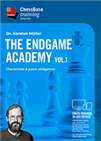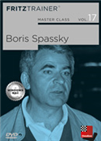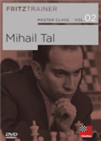A strong record against the best of his era
 From Mating with a queen; a rook; two bishops; a knight and a bishop; to the basics of pawn endgames – here you will gain the necessary know-how to turn your endgame advantages into victories!
From Mating with a queen; a rook; two bishops; a knight and a bishop; to the basics of pawn endgames – here you will gain the necessary know-how to turn your endgame advantages into victories!There are differing accounts of Efim Geller's date of birth. Jeremy Gaige, in his work Chess Personalia. A Bibliography (Jefferson, North Carolina and London 1987), p. 136, states that his birthdate was on 2 March 1925. The authors of the German Wikipedia refer to this date. However, both the English and Russian Wikipedia versions, without citing further sources, mention 8 March 1925. In any case, Geller's birth would have marked his 100th anniversary this year. His birthplace is undisputed: Odessa, Ukraine, then part of the Soviet Union, where he was born into a Jewish family.
When Efim Geller was 16 years old, the Second World War began for the USSR with the invasion of the German Wehrmacht. Geller was drafted towards the end of the war. After his time in the army, he studied economics and obtained a doctorate.
As a teenager, Geller enjoyed playing both basketball and chess, and it was, ironically, his basketball coach - who was also a chess enthusiast - who advised him to focus on chess.
In 1949, Geller won the sem-final of the USSR Championships in Tbilisi ahead of Petrosian and Kholmov and finished in an excellent shared 3rd-4th place in the final tournament, behind Smyslov and Bronstein, alongside Taimanov.
Two years later, he was joint runner-up with Petrosian.
In 1955, Geller won the USSR Championship title for the first time.
In 1979, he won the USSR Championship once again, leaving behind, among others, a very young Kasparov.
He won the Ukrainian SSR Championships four times: in 1950, 1957, 1958 and 1959. Geller participated in six World Championship Candidates Tournaments: in 1953, 1956, 1962, 1965, 1968 and again in 1971.
Geller's record against world champions is particularly noteworthy. He had a positive score against Botvinnik (+4 =6 -1), as well as against Smyslov (+11 =37 -8), and against Petrosian (6-3 with 36 draws - many of them very short, as Geller and Petrosian were close friends). He also had a positive record against Fischer (+5 =2 -3).
His record against Tal was balanced, while he had a negative score against Spassky (+6 =22 -9) and against the significantly younger Karpov (+1 =5 -2). Geller also played against Kasparov and ended with a narrow negative result (=3 -1).
 In this video course, experts including Dorian Rogozenco, Mihail Marin, Karsten Müller and Oliver Reeh, examine the games of Boris Spassky. Let them show you which openings Spassky chose to play, where his strength in middlegames were and much more.
In this video course, experts including Dorian Rogozenco, Mihail Marin, Karsten Müller and Oliver Reeh, examine the games of Boris Spassky. Let them show you which openings Spassky chose to play, where his strength in middlegames were and much more.
Efim Geller | Photo: Dutch National Archive
As a member of the Soviet team, Geller won the gold medal seven times at Chess Olympiads: in 1952, 1954, 1956, 1962, 1968, 1970 and 1980. Between 1961 and 1983, he also won six gold medals with the team at the European Team Chess Championships. Five times, he personally received the gold medal for the best performance on his board.
Despite these great successes against the best players of his time, Geller was never a serious contender for the World Championship title. This was partly because he was a perfectionist with a demanding tactical style, often thinking over his moves for too long, which frequently led to time trouble and even losses on time.
 On this DVD Dorian Rogozenco, Mihail Marin, Oliver Reeh and Karsten Müller present the 8. World Chess Champion in video lessons: his openings, his understanding of chess strategy, his artful endgame play, and finally his immortal combinations.
On this DVD Dorian Rogozenco, Mihail Marin, Oliver Reeh and Karsten Müller present the 8. World Chess Champion in video lessons: his openings, his understanding of chess strategy, his artful endgame play, and finally his immortal combinations.Additionally, Geller led an unhealthy lifestyle - he enjoyed eating in large quantities, was overweight, short of breath, and was also a heavy smoker.

Smokers together: Tal vs Geller (Unknown Photographer)
Geller remained active as a player until 1995. In 1991, he achieved victory at the World Senior Chess Championship. After a long illness, he passed away on 17 November 1998 in Moscow due to cancer.
Links
























